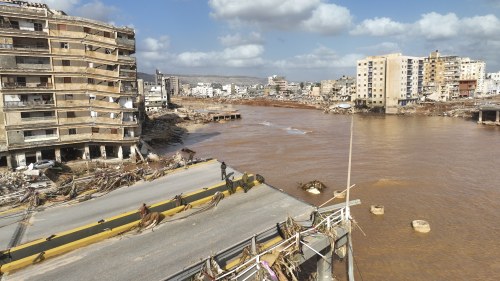Can City Diplomacy Help African Cities Take Action on Climate Mobility?

African cities are experiencing growing climate-related migration that has the opportunity to unlock their economic, social, and cultural development.
Despite contributing less than 4 percent to global carbon emission, Africa is experiencing growing climate-related migration and displacement. In Nigeria, flooding forced more than 2.4 million people to move in 2022. In Somalia, over 1 million persons left their homes due to frequent and intense droughts between January 2021 and September 2022. And in Southern Africa climate events such as tropical cyclones in early 2022 displaced over 1 million persons.
Scenarios by the African Climate Mobility Initiative (ACMI) and the World Bank demonstrate that climate mobility in Africa will continue to rise. The World Bank’s Second Groundswell report foresees that in the absence of sustainable climate and development actions, up to 85.7 million persons in Sub-Saharan Africa and 19.3 million in North Africa could be forced to migrate within their countries by 2050. Focusing on the entire continent, ACMI scenarios show that given high emissions and inequitable development, up to 113 million persons could be forced to move, while a scenario assuming high emissions and more inclusive development forecasts movements of up to 95 million persons by 2050.
African cities are hubs of climate mobility
In the context of rising African urbanization, cities will be at the center of climate-related displacement and migration. The Sixth Assessment Report of the Intergovernmental Panel on Climate Change (IPCC) concludes that “Africa’s rapidly growing cities will be hotspots of risks from climate change and climate-induced in-migration, which could amplify pre-existing stresses related to poverty, informality, social and economic exclusion, and governance”.
While climate mobility will only be one of several parameters in many urban areas, in cities such as Juba, South Sudan, and Jijiga, Ethiopia, climate mobility is predicted to become a major urban growth factor. Even cities that see people leave due to climate change effects, for instance low-lying Lagos in Nigeria, are still overall predicted to grow because of natural population growth and immigration.
People moving because of environmental disasters, loss of livelihoods, or loss of employment related to climate change often settle in marginalized and informal urban settlements. In some cities, such areas include low-lying coastal regions or steep hills, which are themselves at high environmental risk. In these areas, sudden or slow-onset climate events can exacerbate risks including loss of livelihoods in changing ecosystems, destruction of critical physical infrastructure, socio-economic inequality, risks to health, and social tensions.
To address such risks early on, it is crucial to understand that migration under conditions of environmental change is not just a challenge. If well governed, climate mobility unlocks important opportunities for cities’ economic, social and cultural development.
African cities need to become central climate mobility actors
Faced with risks and opportunities, a small but growing number of African local governments has recognized that cities cannot afford to become spaces of climate mobility without transforming into actors as well. However, local governments striving to mainstream climate mobility into urban planning often struggle with a lack of adequate political mandates as well as insufficient local data, financial, and human resources.
African local governments are thus in need of local, national, and international partners. Such partners may draw on local governments’ knowledge and access to local (mobile) communities, while at the same time offering funding, capacity building and networks. Furthermore, partnerships can open local access to those regional and international political fora where policymakers take decisions on climate-related displacement and migration with direct impact on African cities.
Establishing local-national and local-international policy dialogues could enable local governments to overcome the urban migration governance paradox: while many African cities are first responders to climate change with day-to-day experience in driving climate adaptation and mitigation, local governments remain excluded from (inter)national policy processes discussing climate mobility.
City diplomacy is a key strategy for new partnerships
A small number of African cities make use of city diplomacy to search for (inter)national partners, to access funding and to claim a seat in international negotiations on climate mobility. Led by the Mayors of Freetown, Sierra Leone, and Dhaka North, Bangladesh, mayors from around the world have founded the C40-MMC Global Mayors Task Force on Climate and Migration in 2021.
The Task Force published an Action Agenda at COP26, calling upon national governments, financial institutions, international organizations and central banks to recognize cities as drivers of national and global action on climate mobility and to work in partnership with local governments.
Partnerships are indeed key for local governments striving to access international funding and participate in international conferences. Central partners for African cities include the city networks C40, Mayors Migration Council, and the Mayors Mechanism, philanthropic actors, such as the Robert Bosch Stiftung, the Ikea Foundation and the Open Society Foundations, and multi-stakeholder partnerships such as the African Climate Mobility Initiative.
One concrete result of cooperative action bridging international, national and local levels is the Global Cities Fund (GCF): launched originally in the context of the Covid-19 pandemic, the climate chapter of the GCF supports ten inclusive city-led initiatives in Africa.
Managed by the Mayors Migration Council, the fund does not only enable local governments to create or scale migrant and refugee-inclusive climate adaptation and mitigation but also demonstrates what local governments are capable of achieving if they have access to adequate resources.
Successful climate action needs multi-stakeholder partnerships
As cities in Africa (and worldwide) transform into hubs of climate mobility, local governments need to assume central roles in multi-stakeholder partnerships operating at local, regional and global levels. To make such partnerships work, national governments, international donors, and development organizations have to acknowledge that they cannot achieve sustainable climate action without the context-specific expertise of local governments and communities.
National statistical offices and international organizations need to break data down to the urban level to allow for effective early warning systems and evidence-driven policy making. Local governments need to be able to access international funding, such as the loss and damage fund, to be discussed at COP28 in December 2023.
Donors and development agencies working on climate adaptation and migration policies need to develop strategies in cooperation with national and local governments instead of considering them mainly as implementation partners. Breaking up top-down approaches and building cross-sectoral partnerships that bridge local, national and international levels will be a key challenge in climate policy-making in the years to come.

